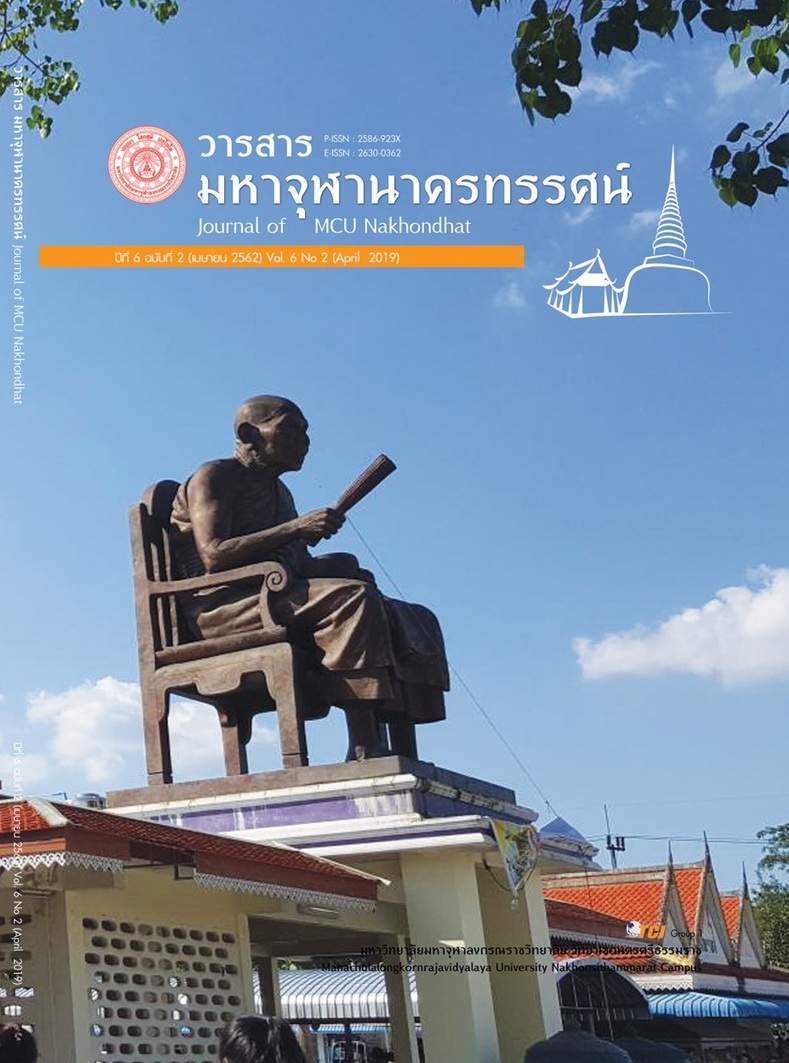A MODEL OF LIFE SKILLS DEVELOPMENT BASED ON BUDDHIST EDUCATIONAL ADMINISTRATION OF STUDENTS IN EDUCATIONAL INSTITUTIONS UNDER THE SECONDARY EDUCATIONAL SERVICE AREA OFFICE
Main Article Content
Abstract
This research aimed to; 1. Study the state of life skills based on Buddhist educational administration of school students, 2. Develop a model of life skills based on Buddhist educational administration of school students, and 3. Propose the model of life skills based on Buddhist educational administration of students in schools under the Office of Secondary Educational Service Area. The mixed research methods were used in the study. The qualitative data were collected from documents, in-depth interviews.
The research results found that;
- The state of life skills based on Buddhist educational administration of school students, the first priority was on Good Conduct in Action, followed by Good Conduct in Thought, and Good Conduct in Speech. In social skills of Good Conduct in Action, students could manage and solve problems by themselves, and in career skills, students realized the importance of work and punctuality. In Good Conduct in Speech in communication skills aspect, students knew how to listen to the others and with cross-cultural skills; they felt proud and satisfied in their own culture. Thinking skills in Good Conduct in Thought, students could decide and find ways in solving problems, in mental skills, they understood similarity and dissimilarity of individuals and in emotional skills, they could manage emotions having negative results.
- The development of a model of life skills based on Buddhist educational administration of students in schools under the Office of Secondary Educational Service Area consisted of 5 components; 1) Principle, 2) Objective, 3) Life skills development process that consisted of (1) Life skills components, (2) Life skills development step, (3) Dhamma for Life skills development, (4) Life skills development project, 4) Application, and 5) Achievement condition.
- The result of examination and evaluation of the model of life skills based on Buddhist educational administration of students in schools under the Office of Secondary Educational Service Area was at a high level totally. In details, the highest level was on usefulness, followed by accuracy, appropriateness, and feasibility respectively.
Article Details
How to Cite
พลเสน ณ., ศิริวรรณ อ., & เรืองสังข์ ร. (2019). A MODEL OF LIFE SKILLS DEVELOPMENT BASED ON
BUDDHIST EDUCATIONAL ADMINISTRATION OF STUDENTS
IN EDUCATIONAL INSTITUTIONS UNDER THE SECONDARY
EDUCATIONAL SERVICE AREA OFFICE. Journal of MCU Nakhondhat, 6(2), 548–564. retrieved from https://so03.tci-thaijo.org/index.php/JMND/article/view/182632
Section
Research Articles
References
จิราภรณ์ ศิริทวี. (2552). โรงเรียนสาธิตแห่งมหาวิทยาลัยเกษตรศาสตร์. ศูนย์วิจัยและพัฒนาการศึกษา คณะศึกษาศาสตร์ วิทยาเขตบางเขน.
บุญชม ศรีสะอาด. (2535). การวิจัยเบื้องต้น. กรุงเทพมหานคร: สุวีริยาสาส์นการพิมพ์.
ปานทอง อังคณิตย์. (2558). การเสริมสร้างทักษะชีวิตนักเรียนระดับการศึกษาขั้นพื้นฐานโดยใช้การวิจัยเชิงปฏิบัติการแบบมีส่วนร่วม. ใน ครุศาสตรดุษฎีบัณฑิต . มหาวิทยาลัยราชภัฏบุรีรัมย์.
พิเชษฐ์ โพธิ์ภักดิ์. (2553). การพัฒนารูปแบบการบริหารโรงเรียนนิติบุคคล สังกัดสำนักงานคณะกรรมการการศึกษาขั้นพื้นฐาน. ใน ครุศาสตรดุษฎีบัณฑิต (สาขาบริหารการศึกษา). จุฬาลงกรณ์มหาวิทยาลัย.
สำนักงานส่งเสริมสวัสดิภาพและพิทักษ์เด็กและเยาวชนผู้ด้อยโอกาสและผู้สูงอายุ. (2554). การวิจัยพัฒนาการเด็กแบบองค์รวมของเด็กไทยของสำนักงานส่งเสริมสวัสดิภาพและพิทักษ์เด็ก และเยาวชนผู้ด้อยโอกาสและผู้สูงอายุ. กรุงเทพมหานคร.
สุภางค์ จันทวานิช. (2540). วิธีวิจัยเชิงคุณภาพ. กรุงเทพมหานคร: จุฬาลงกรณ์ราชวิทยาลัย.
บุญชม ศรีสะอาด. (2535). การวิจัยเบื้องต้น. กรุงเทพมหานคร: สุวีริยาสาส์นการพิมพ์.
ปานทอง อังคณิตย์. (2558). การเสริมสร้างทักษะชีวิตนักเรียนระดับการศึกษาขั้นพื้นฐานโดยใช้การวิจัยเชิงปฏิบัติการแบบมีส่วนร่วม. ใน ครุศาสตรดุษฎีบัณฑิต . มหาวิทยาลัยราชภัฏบุรีรัมย์.
พิเชษฐ์ โพธิ์ภักดิ์. (2553). การพัฒนารูปแบบการบริหารโรงเรียนนิติบุคคล สังกัดสำนักงานคณะกรรมการการศึกษาขั้นพื้นฐาน. ใน ครุศาสตรดุษฎีบัณฑิต (สาขาบริหารการศึกษา). จุฬาลงกรณ์มหาวิทยาลัย.
สำนักงานส่งเสริมสวัสดิภาพและพิทักษ์เด็กและเยาวชนผู้ด้อยโอกาสและผู้สูงอายุ. (2554). การวิจัยพัฒนาการเด็กแบบองค์รวมของเด็กไทยของสำนักงานส่งเสริมสวัสดิภาพและพิทักษ์เด็ก และเยาวชนผู้ด้อยโอกาสและผู้สูงอายุ. กรุงเทพมหานคร.
สุภางค์ จันทวานิช. (2540). วิธีวิจัยเชิงคุณภาพ. กรุงเทพมหานคร: จุฬาลงกรณ์ราชวิทยาลัย.


